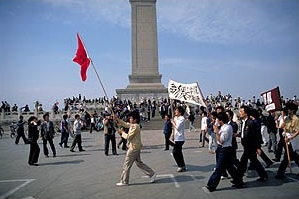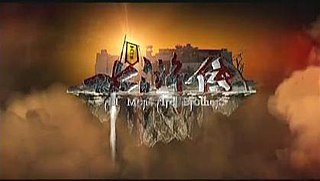Related Research Articles

The Tiananmen Square protests, known as the June Fourth Incident in China, were student-led demonstrations held in Tiananmen Square, Beijing during 1989. In what is known as the Tiananmen Square Massacre, troops armed with assault rifles and accompanied by tanks fired at the demonstrators and those trying to block the military's advance into Tiananmen Square. The protests started on April 15 and were forcibly suppressed on June 4 when the government declared martial law and sent the People's Liberation Army to occupy parts of central Beijing. Estimates of the death toll vary from several hundred to several thousand, with thousands more wounded. The popular national movement inspired by the Beijing protests is sometimes called the '89 Democracy Movement or the Tiananmen Square Incident.

Chai Ling is a Chinese psychologist who was one of the student leaders in the Tiananmen Square protests of 1989. She is the founder of All Girls Allowed, an organization dedicated to ending China's one-child policy, and the founder and president of Jenzabar, an enterprise resource planning software firm for educational institutions.

Dai Qing is a journalist and activist for China-related issues; most significantly against the Three Gorges Dam Project. Dai is also an author who has published many influential books, articles, and journals.

The Gate of Heavenly Peace is a 1995 documentary film, produced by Richard Gordon and Carma Hinton, about the Tiananmen Square protests of 1989.

Red China Blues: My Long March from Mao to Now is a 1996 book by Chinese-Canadian journalist Jan Wong. Wong describes how the youthful passion for left-wing and socialist politics drew her to participate in the Chinese Cultural Revolution. Speaking little Chinese, she became one of the first Westerners to enroll in Beijing University in 1972.
Moving the Mountain is a 1994 feature documentary directed by Michael Apted and produced by Trudie Styler, with cinematography by Maryse Alberti and music by Liu Sola.

All Men Are Brothers is a 2011 Chinese television series adapted from Shi Nai'an's 14th century novel Water Margin, one of the Four Great Classical Novels of Chinese literature. The series is directed by Kuk Kwok-leung and features cast members from mainland China, Taiwan and Hong Kong. The series was first broadcast on 8TV in March 2011 in Malaysia.
The Beijing Workers' Autonomous Federation (BWAF), or Beijing Workers’ Autonomous Union was the primary Chinese workers' organization calling for political change during the Tiananmen Square protests of 1989. The group was formed in the wake of mourning activities for former General Secretary Hu Yaobang in April 1989. The BWAF denounced political corruption, presenting itself as an independent union capable of "supervising the Communist Party," unlike the Party-controlled All-China Federation of Trade Unions (ACFTU).
The April 26 Editorial was a front-page article published in People's Daily on April 26, 1989, during the Tiananmen Square protests. The editorial effectively defined the student movement as a destabilizing anti-party revolt that should be resolutely opposed at all levels of society. As the first authoritative document from the top leadership on the growing movement, it was widely interpreted as having communicated the party's position of "no-tolerance" to student protesters and their sympathizers.

Feng Congde is a Chinese dissident and Republic of China Restoration activist. He came into prominence during the Tiananmen Square protests of 1989 as a student leader from Peking University, which placed him onto the Chinese government's 21 Most Wanted list. He spent 10 months hiding in various locations in mainland China, until he was smuggled out to Hong Kong on a shipping vessel.
The Beijing Students' Autonomous Federation was a self-governing student organization, representing multiple Beijing universities, and acting as the student protesters' principal decision-making body during the 1989 Tiananmen Square protests. Student protesters founded the Federation in opposition to the official, government-supported student organizations, which they believed were undemocratic. Although the Federation made several demands of the government during the protests and organized multiple demonstrations in the Square, its primary focus was to obtain government recognition as a legitimate organization. By seeking this recognition, the Federation directly challenged the Chinese Communist Party's authority. After failing to achieve direct dialogue with the government, the Federation lost support from student protesters, and its central leadership role within the Tiananmen Square protests.
Yan Mingfu is a retired Chinese politician. His first prominent role in government began in 1985, when he was made leader of the United Front Work Department for the Chinese Communist Party (CCP). He held the position until the CCP expelled him for inadequately following the party line in his dialogues with students during the 1989 Tiananmen Square protests. Yan returned to government work in 1991 when he became a vice minister of Civil Affairs.
A Heart for Freedom: The Remarkable Journey of A Young Dissident, Her Daring Escape, And Her Quest to Free China's Daughters is an autobiography by Chai Ling (柴玲), one of the student leaders in the Tiananmen Square protests of 1989 in Beijing, China. The book was published in 2011 by Tyndale House, a Christian press based in Illinois.
The April 27 demonstrations were massive student protest marches throughout major cities in China during the Tiananmen Square Protests of 1989. The students were protesting in response to the April 26 Editorial published by the People's Daily the previous day. The editorial asserted that the student movement was anti-party and contributed to a sense of chaos and destabilization. The content of the editorial incited the largest student protest of the movement thus far in Beijing: 50,000–200,000 students marched through the streets of Beijing before finally breaking through police lines into Tiananmen Square.
Defend Tiananmen Square Headquarters was formed on May 24, 1989. The purpose of this organization was to create a strong leadership to lead the student movement.

A Tiananmen Journal: Republic on the Square by Feng Congde (封从德) was first published in May 2009 in Hong Kong. This book records the Tiananmen protest of 1989 from April 15, 1989, to June 4, 1989, in detail. Author Feng Congde is one of the student leader in the protest and his day-by- day diary entries, record every activity during the protest including the start of student protests in Peking University, the activities of major student leaders, important events, and unexposed stories about student organizations and their complex decision making.
The catalyst for the birth of the Pro-Democracy Movement was the death of Hu Yaobang on April 15, 1989. Beginning in late April until June 3 large crowds gathered in Tiananmen Square. During this period a significant amount of money was donated to the student organizations, it was spent on providing food, water and other supplies required to sustain the many thousands of protesters who occupied the Square.
The first of two student hunger strikes of the Tiananmen Square protests of 1989 began on May 13, 1989, in Beijing. The students said that they were willing to risk their lives to gain the government's attention. They believed that because plans were in place for the grand welcoming of Mikhail Gorbachev, the leader of the Soviet Union, on May 15, at Tiananmen Square, the government would respond. Although the students gained a dialogue session with the government on May 14, no rewards materialized. The Chinese Communist Party did not heed the students' demands and moved the welcome ceremony to the airport.

The Great Emperor in Song Dynasty is a 2015 Chinese historical TV series directed by Gao Xixi, starring Chen Jianbin as Emperor Taizu of Song who founded the Song dynasty and reunified most of China proper.
The 1989 Tiananmen Square protests and massacre, commonly known in mainland China as the June Fourth Incident, were student-led demonstrations in Beijing in 1989. More broadly, it refers to the popular national movement inspired by the Beijing protests during that period, sometimes called the '89 Democracy Movement. The protests were forcibly suppressed after Chinese Premier Li Peng declared martial law. In what became known in the West as the Tiananmen Square Massacre, troops with assault rifles and tanks fired at the demonstrators trying to block the military's advance towards Tiananmen Square. The number of civilian deaths was internally estimated by the Chinese government to be near or above 10,000.
References
- ↑ Lee Feigon, "Gender and The Chinese Student Movement," in Popular Protest and Political Culture in Modern China, ed. Jeffrey N. Wasserstrom and Elizabeth Perry (Boulder: Westview Press: 1994), 128.
- ↑ Chai Ling, A Heart for Freedom: The Remarkable Journey of a Young Dissident, Her Daring Escape, and Her Quest to Free China's Daughters (Carol Stream: Tyndale House Publishers, 2011), 91-92, 102.
- ↑ Li Lu, Moving the Mountain: My Life in China from the Cultural Revolution to Tiananmen Square (London: Macmillan, 1990), 133.
- ↑ Dingxin Zhao, The Power of Tiananmen: State-Society Relations and the 1989 Beijing Student Movement (Chicago: The University of Chicago: 2001), 163.
- ↑ Li, Moving the Mountain, 131-133.
- ↑ Shen Tong and Marianne Yen, Almost a Revolution (Boston: Houghton Mifflin, 1990), 276.
- ↑ Han Minzhu and Hua Sheng, "Taped Interview with Student Leader Chai Ling in Late May" in Cries for Democracy: Writings and Speeches from the 1989 Chinese Democracy Movement (Princeton: Princeton University Press, 1990), 198.
- ↑ Zhao, The Power of Tiananmen, 164.
- ↑ Zhang Liang, The Tiananmen Papers, trans. Andrew J. Nathan and Perry Link (New York: PublicAffairs, 2001), 171.
- ↑ Zhao, The Power of Tiananmen, 182.
- ↑ Chai, A Heart for Freedom, 190.
- ↑ Li, Moving the Mountain, 200.
- ↑ Zhao, The Power of Tiananmen, 163.
- ↑ Zhao, The Power of Tiananmen, 163, 166.
- ↑ Han and Sheng, Cries for Democracy, 241.
- ↑ Zhao, The Power of Tiananmen, 163.
- ↑ Zhao, The Power of Tiananmen, 164.
- ↑ Zhao, The Power of Tiananmen, 166.
- ↑ Zhao, The Power of Tiananmen, 167.
- ↑ Wang Chaohua, "A Dialogue on the Future of China" in One China, Many Paths (London: Verso, 2003), 318.
- ↑ Dai Qing, Tiananmen Follies: Prison Memoirs and Other Writings, trans. Nancy Yang Liu, Peter Rand, and Lawrence R. Sullivan (Norwalk: EastBridge, 2005), 67.
- ↑ Zhang, The Tiananmen Papers, 139.
- ↑ Dai, Tiananmen Follies, 70.
- ↑ Zhang, The Tiananmen Papers, 165.
- ↑ Zhang, The Tiananmen Papers, 166.
- ↑ Zhang, The Tiananmen Papers, 166.
- ↑ Dai, Tiananmen Follies, 88.
- ↑ Jan Wong, Red China Blues: My Long March From Mao to Now (Toronto: Doubleday/Anchor Books, 1996), 242-244.